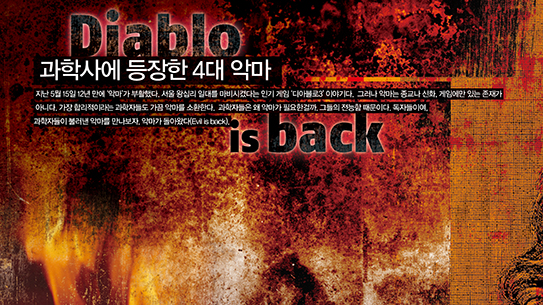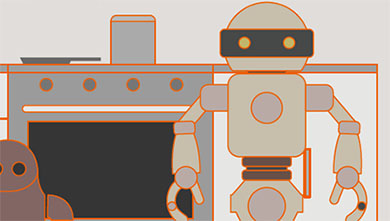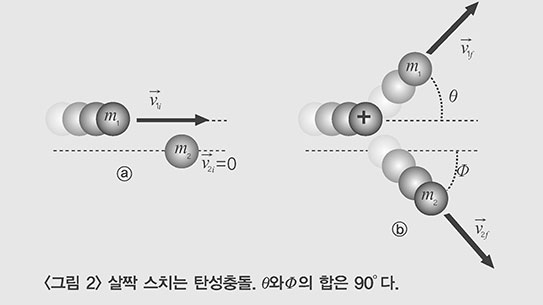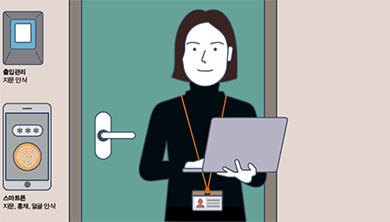
금지된 지식을 얻은 인간을 검열하고 처벌한 인류의 역사가 에덴동산 시절부터 있었음에도 불구하고, 인류가 축적한 정보는 증가해왔다. 소위 정보화 시대라고 불리는 현재에도 정보를 획득·사용하고 이동·저장하는 방법에 관한 보고서가 매일 나오고 있다.
현재 기술적인 연구의 빠른 진척속도로 볼 때, 미래에 있어서 정보가 처리되는 주요한 방법은 세가지로 정리될 것으로 보인다. 그 하나는 머지않아 전자공학에 맞설 것으로 보이는 광자학이다.
광자(光子)라고 불리는 빛의 입자는 전자공학에서 사용되는 전자와 달리 전하를 전혀 가지고 있지 않기 때문에 쉽게 흡수되거나 분산되지 않고서도 이동될 수 있다. 빛은 파장이 상대적으로 짧고 쉽게 변조 할수 있기 때문에 더 많은 정보를 운반할 수 있다.
아주 가는 유리 섬유를 사용하여 빛의 형태로 정보를 전달하는 광섬유기술은 이미 원거리 전화선과 의학용 모니터에 사용되고 있다. 새로운 광자학은 정보를 한 곳에서 다른 곳으로 빠르고 정확하게 전달하는 인간의 능력을 혁신적으로 변화시킬지도 모른다. 미국에 있는 유나이티드 테크놀로지 포토닉사에서는 최근 특수한 경로를 통해서 광자를 반사시키고 가속시키는 새로운 방법을 개발하고 있다고 한다.
정보를 처리하는 두번째 방법은 초(超)분자 화학을 이용하는 것이다 이 분야에 관한 필자의 지식은 그 기술에서 사용하는 박막 필름의 두께만큼 밖게 되지 않는다. 그러나 초박필름 위에 있는 자기 조립자들의 화학적 복합물은 아주 작고도 효율적인 스위치가 될 것으로 보인다. 이 기술은 미래의 컴퓨터를 만드는데 시용될 것으로 기대된다.
세번째 방법으로는 지금의 전자공학을 재현시키는 것을 들 수 있다. 뉴저지 벨코어 연구실의 물리학자 마크 존슨은 전기를 전도시키는 금속을 사용하여 보통의 실리콘 칩과 다른 '스핀 트랜지스터 '를 발명하였다.
스핀 트랜지스터에서 전자는 금으로 만들어진 박막 필름의 어느 한쪽 면에 입혀진 두 줄의 자석 띠 중 하나에 일렬로 정렬된다. 만일 전자가 특정한 방향으로 자기장을 받으면 전자는 금박 위를 지나 한 쪽 띠에서 다른 쪽 띠로 이동되고, 이것으로 온 오프 스위치가 만들어진다. 스핀 트랜지스터는 전류가 차단된 후에도 입력된 자기 띠 위의 자기극성을 기억하게 되는 셈이다.
지금 스핀 트랜지스터는 실험 수준에 그치고 있고, 매우 낮은 온도에서만 작동되고 있지만, 궁극적으로 이 장치는 컴퓨터를 근본적으로 변화시켜 더 지능적이고 빠르며 작은 크기의 컴퓨터를 탄생시킬 것이다.
정보에 대해서 완벽히 정의하자면 알고리즘 이론과 혼돈 이론의 넓은 분야까지 포함해야 할 것이다. 그러나 근원적으로 본다면 정보란 말은 구체화시키는 것, 즉 지식에 형태를 입혀서 주고받을 수 있도록 하는 것을 뜻하는 라틴어 '인포마레'에서 유래했다.
통신은 우리가 생각하는 것보다 훨씬 더 폭넓은 것이다. 대부분의 생물은 냄새와 소리, 촉감과 몸짓 등으로 통신을 한다.
그러나 요즘과 같은 컴퓨터 시대에서 지식이라는 말은 갈수록 데이터를 의미하게 된다. 그 데이터란 텔레비전에 나오는 귀여운 인조인간의 형태가 아니라, 앞으로 그 형태는 어떻게 되더라도 결국은 코드로 바뀌어서 컴퓨터에 들어갈 수 있는 사실적인 정보의 일종이 될 것이다.
지금과 미래의 정보처리는 거의 마술과 같은 것이다. 사람보다도 말소리를 더 잘 구별해내는 시스템이 이미 사용되고 있다. 이로 인해서 허가된 사용자만을 검사해내는 일이 쉬워지고 있다. 또 다른 컴퓨터 기술로는 물체를 '잘라' 코드의 형태로 분리한 뒤, 한 컴퓨터에서 멀리 떨어진 다른 공장의 컴퓨터로 그 코드를 보내 다시 그 물체를 재조립하게 할 수도 있다. 이미 어떤 도시에서는 무선장치를 가진 교통경찰이 주차비를 내었는지를 알아내기 위해서 우리의 자동차 번호를 거대한 데이터 은행의 컴퓨터로 보내 조회해본다.
흥미로운 것은 비록 우리의 문명은 이러한 전자나 광자의 형태로 실려오는 정보들로 넘쳐나지만, 멀티미디어 잡지의 독자들은 종이에 인쇄된 것을 더 선호한다는 점이다. 미래에는 모든 것이 스크린 상으로 읽혀질 것이라고 하지만, 그러한 주장에 대하여 아직 논쟁의 소지는 있다. CD롬으로 발간되는 인터랙티브 뉴스위크지의 편집장인 마이클 로저스는 "글로 기록하는 것은 아주 지능적인 데이타압축 방법"이라고 말한다.
그러나 넘쳐나는 정보를 따라 잡느라고 생기는 골치아픔 말고, 진짜 다른 위험은 무엇일까? 수년간 과학소설 작가들은 과중한 정보가 넘쳐나거나, 정보가 저장되고 검색하는데 있어 절대 안전하다고 여겨진 방식에서도 잘못이 생기는, 문명에서 일어남직한 사건에 관하여 우울하거나 우스운 이야기를 써 왔다. 지금도 우리는 매우 자주 정보를 활용할 수 없음을 의미하는 "컴퓨터가 다운되었다"는 이야기를 듣는다.
날이 갈수록 문명은 정보에 의해서 운영된다. 하지만 그것을 모두 없애버려야 한다는 느낌이 때로 든다면, 결국 블랙홀과 같은 쓰레기 처리장이 필요할 것이다. 요즘 물리학자들은 스티븐 호킹의 아이디어와 같이 블랙홀로 영원히 사라져 버리는 정보에 관하여 생각한다. 한편 어떤 사람들은 우주 안에서 정보는 항상 존재해야 하므로 그것은 불가능하다고 말한다. 캐나다 알버타 대학의 도날드 페이지와 같은 사람의 추측에 의하면 정보는 블랙홀에 잠시 들어갔다가 다시 나올 수도 있고, 여기서 사라진다면 다른 우주에서 다시 나타날 수도 있다고 한다.
그렇다면 다른 우주가 정보의 과잉으로 고통을 겪을지도 모를 일이다.
In spite of the history of censorship and punishment of people who acquire forbidden knowledge (beginning in the Garden of Eden), human accumulation of information has increased. In this so-called information age, every day there are reports of new ways of getting, using, moving and storing information.
Technological research seems to be rapidly evolving three main ways that information will probably be handled in the future. One is photonics, a technology soon to rival electronics.
Unlike the electrons used in electronics, the particles of light called photons do not have any charge, so they can travel without being easily absorbed or scattered. The smaller wavelengths of light and the ease of modulating them makes it possible for light to carry more information.
Fiber-optics technology—tiny glass fibers carrying information in the form of light—is already here, in long—distance phone lines and medical monitors. New photonics may revolutionize the human ability to move information quickly and accurately from one place to another. Currently United Technologies Photonics' plants in the United States are developing new ways of reflecting and speeding photons in special channels.
A second method of handling information uses supramolecular chemistry. My depth of understanding of this subject is as small as the depth of the films it uses, but it seems that self-assembling chemical compounds on ultrathin films can be turned into tiny, efficient switches. It's hoped this technology will be of use in computers of the future.
A third method is to improve the current one, electronics. Physicist Mark Johnson, at Bellcore research labs in New Jersey, has invented a remarkable "spin transistor" made, unlike ordinary silicon chips, of metals that conduct electricity.
In the spin transistor, electrons are aligned on one of two magnetic strips on either side of a thin film of gold. The electrons can move across the gold to the other strip if it, too, is magnetized in a particular way, which makes it an on-off switch. The spin transistor "remembers" the magnetic polarity of the receiving strip, even after the current is off.
Right now the spin transistor is an experiment, and one that works only at very low temperature, but eventually this new device may revolutionize computers, making them smarter, faster and smaller.
A complete definition of information includes algorithms and the wilder reaches of chaos theory, but basically "information" comes from the Latin informare, to put into shape—to give form to knowledge, so that it can be communicated and received.
Communication is a topic vaster than human use of it. Most living things "communicate" through odors, sounds, touch, gestures and more.
But in these computer-run times, knowledge increasingly means data-not the lovable TV android, but the kind of factual information that can be coded and put into computers, whatever they are now or will be in the future.
Present and future information handling is almost magical. Systems are in the works that are better at identifying spoken words than any human-making it easier to check on authorized users. Another computer technology "cuts" an object into slices that, as coded data, can be sent from one computer to another in a faraway factory for assembling the object. And already in some cities, traffic cops with hand-held, wireless gadgets can send your license plate number into big computer data banks to find out if you've paid your parking tickets.
With all these information-laden patterns of electrons and/or photons flooding civilization, it's amusing that the readers of multimedia magazines prefer them in the printed from, on paper. Even if future reading matter is on a screen, it will be in words. According to Michael Rogers, managing editor of Newsweek Interactive, which is "published" on CD-ROM, "text is intellectual data compression, and it's a real cool thing."
But what's the danger, aside from headaches acquired from trying to keep up with the information flood? For years science fiction writers have been writing sad or funny stories about what can happen to civilizations that not only become overloaded with information, but store and retrieve it in supposedly fail-safe ways that somehow go wrong. Right now, we hear all too often "the computer is down", meaning that information is not available.
More and more, civilization runs on information, but if you sometimes feel like chucking it all away, here's the ultimate in garbage disposal units-a black hole. Lately physicists have taken up Stephen Hawking's idea of information vanishing permanently down a black hole. Some say it's not possible-that in the universe, information will always exist. Others like Donald Page, of the University of Alberta, Canada, speculate that information may dip in and then out of a black hole, or that if it does disappear, it may reappear in some other universe.
One wonders if that other universe suffers from information overload!
(c) 1993, Los Angeles Times Syndicate










